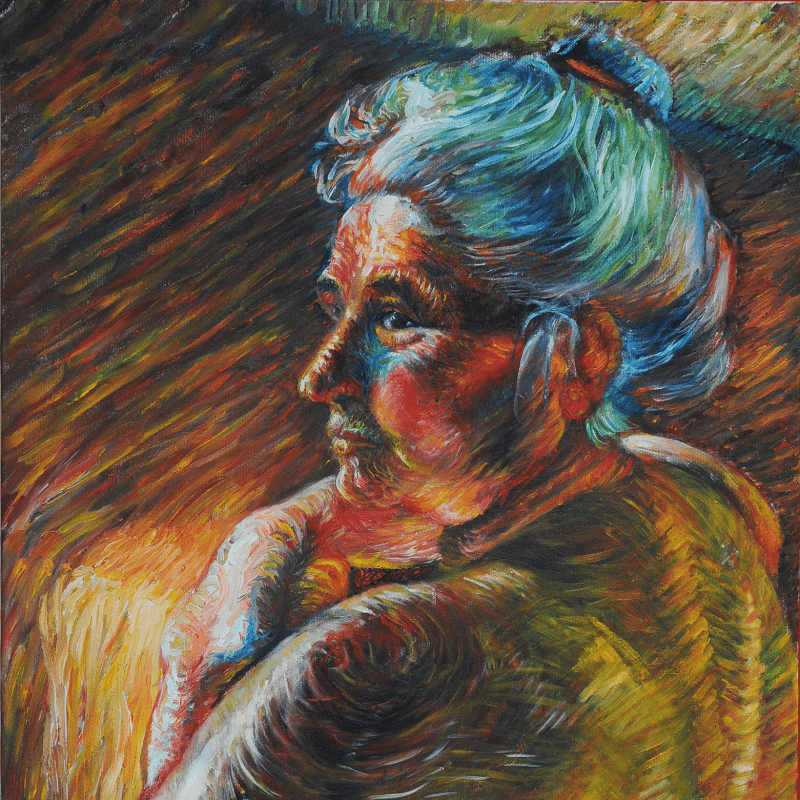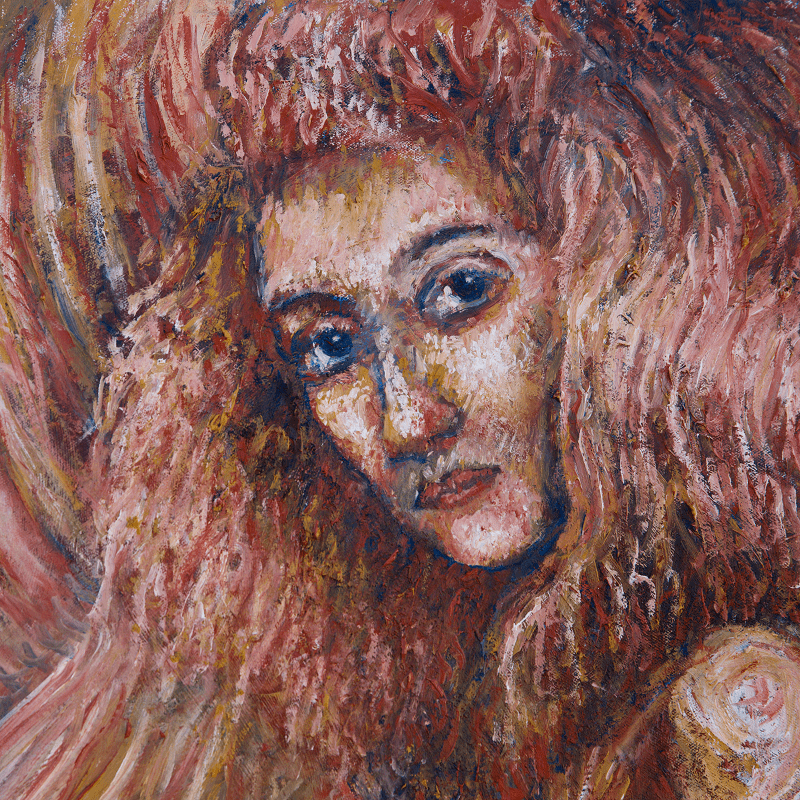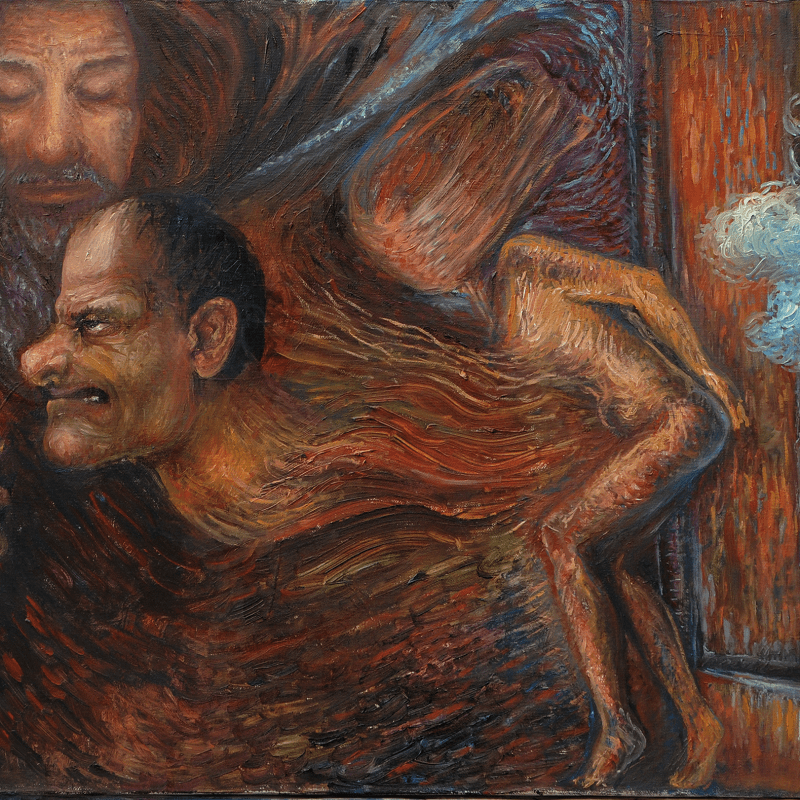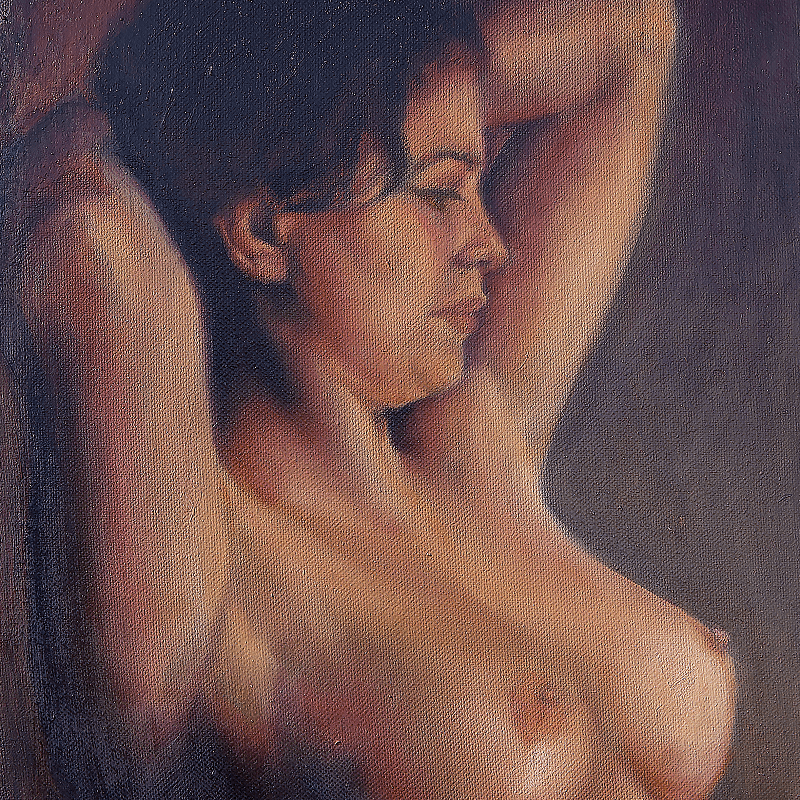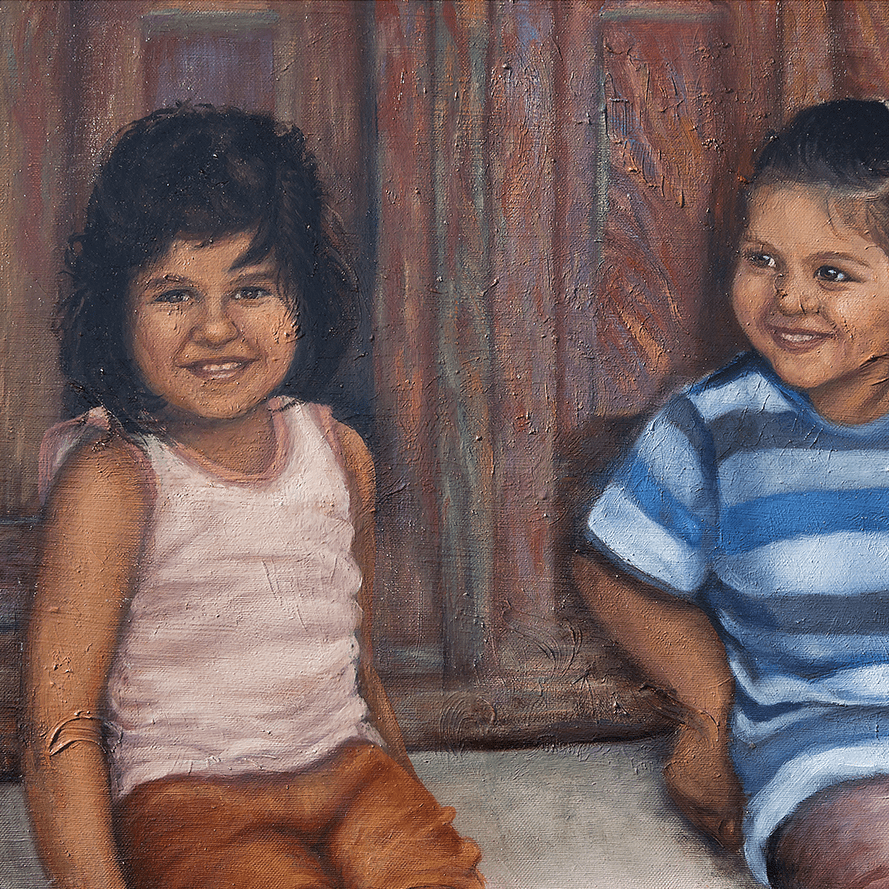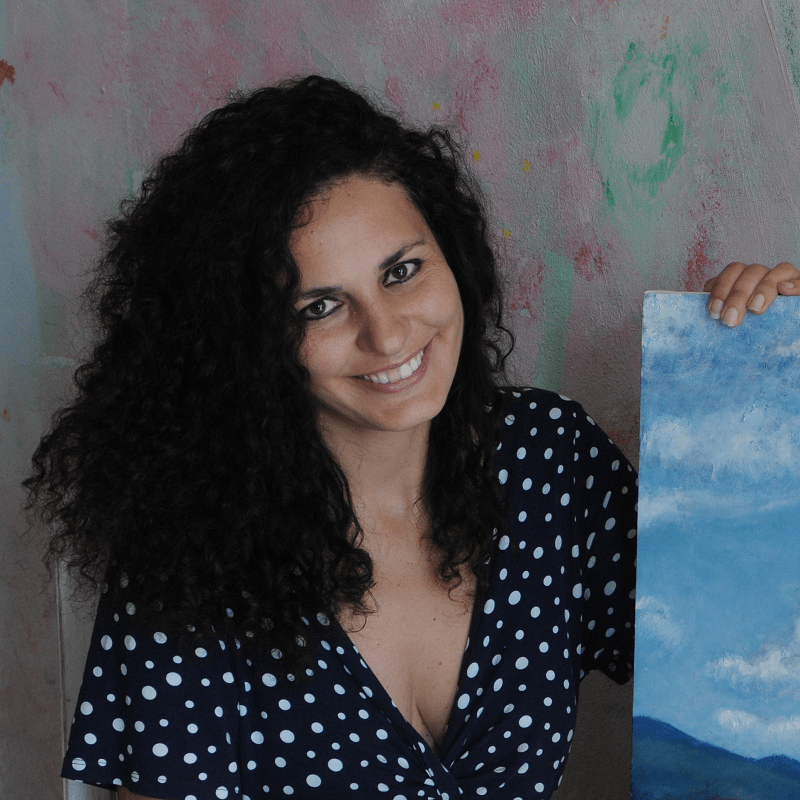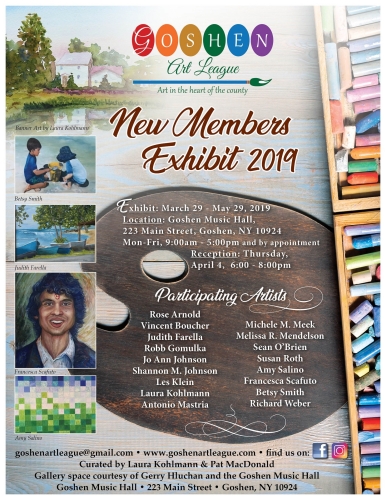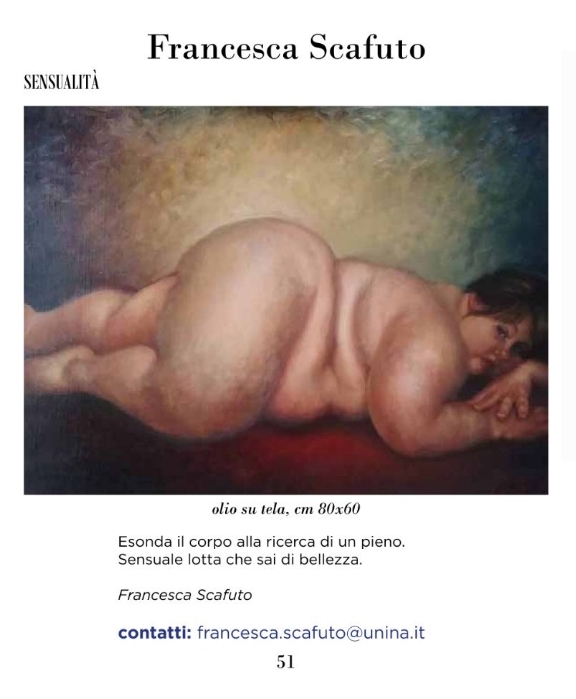The artist is her act
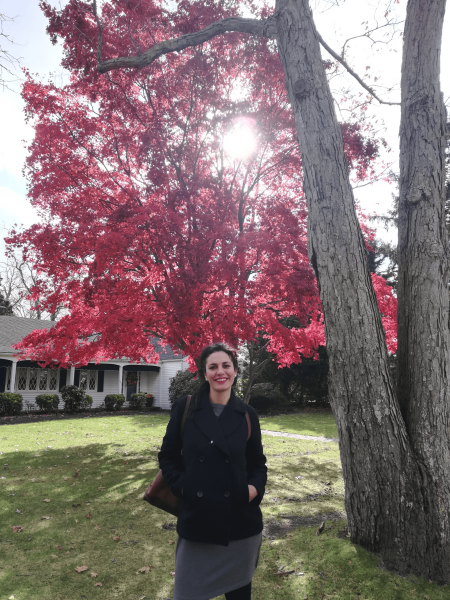
Dr. Francesca Scafuto is an artist, a researcher and a psychotherapist. She is currently a Fulbright Visiting Scholar at Ramapo College of New Jersey. Her emerging practice involves the intersection of mindfulness, ecological awareness, and art methods.

| Name | : | Francesca Scafuto |
| Phone | : | +1 201 786 3607 |
| : | fscafuto@ramapo.edu | |
| Address | : | 505 Ramapo Valley Road, Mahwah, NJ, United States 07430 |
Art Work
My brush strokes blend the human body with the surroundings, meshing the inner turbulences with the landscapes in an attempt to resolve the conflict of the dualities.
Art for me
My artistic research portrays a dialogue between internal and external worlds, where originality is given by bringing together harmony and signification to respond to one's interior need.
"Art moved by a profoundly interior need," Kandjinsky said in the search for a universal inner symbolism that allows us to go beyond the appearances of reality, the idols of materialism and rationalism, to "speak of mystery through mystery". Art as an activator of a power of the unconscious that comes to man and woman as the metaphysical painters showed, through intuition and the analogical language of free associations. It expresses our own way, specific and unique, to be in the world towards the truth of a more authentic and profound self, unmasking and "playing" with the egoic dimensions of the Person.
Art seen as genesis, creation, not as a return to primitive, to pre-verbal, to undifferentiation, but as going further, passing and using experience to integrate immanence and transcendence, bringing assimilation of the opposites. Its derivative is the symbol, rather than the "symptom", that is the reconciliation of the dualities. Duality as the principle of existence, which in art is understood as complementary rather than as dichotomies, antagonistic and conflicting forces.
Art is a process that is embodied in imaginative products which are in themselves images but are already actions. In my opinion, the product and the process go hand in hand: I attribute importance to the quality of the experience, in many cases, curative of the artistic process but also to the quality and aesthetics of the resulting product.
Therefore, art is not only an instrument, but a drive, a daemon that manifests itself in the need for alchemical transformation of the being, learning from experience and regeneration of the world as it is seen, perceived and created by the artist. Art does not need utilitarian reasons to be, because it is in itself revelation and evolution of human potential.
Art also means to me a space of participation in which the spectator is involved. It cannot be a truly transformative process if it does not have the potential for identification and projection of the one to whom it is addressed. In other words, art is a two-way communication where there is space left for the wandering, the imagination and the feelings of the spectator.
So too conceptual an art abstracts and moves away from its audience, enclosing itself in a speculative action of the rational mind which does not leave space and air for an intimate dialogue, necessary for transformation. In the same way an art very technically packaged but easily intelligible to its spectators, can be too immediate and saturate every space of imagination of those experiencing it.
In sum, art can be seen as a continuous research of synthesis and harmonic evolution of experiences where every true artist is in itself a researcher, and only a true researcher is an artist.
Training and Exhibition
A list of my training and exhibitons as a painter.
-
Training
2019 | Anatomy and Life Drawing and Painting | School of Contemporary Arts, Ramapo College, US | Instructor: Jacqueline Skrzynski | Draw from the nude, studies in gestures, composition, abstracting the figure and drapery
2013-2016 | Still Life Drawing, Painting from Author References | Atelier Nerodimarte, Napoli | Instructor: Domenica Piccolo
2009-2012 | Still Life Drawing, Painting from Author References | Studio Pisacane, Napoli | Instructor: Fernando Pisacane
2003-2004 | The Study of the Nude | Academy of Fine Arts, Napoli | Instructor: Mario Punzo
Employement
As an artist, psychotherapist and community psychologist, I prefer to say that my job is discovering human potential, supporting it in the process of liberation through awareness of patterns and scripts that can consume the spontaneity of relationships. Each of us is a set of information, our consciousness stems from connection with other intelligences. The more we develop connections, the more our consciousness becomes global, informed, and increasingly able to respond in a unique way to the environment and to create new solutions and interaction strategies. The basis of art as a cure is being more in touch with our “true self” in an ever more authentic way and developing what is a natural tendency to beauty, harmony, enchantment. It also involves overcoming blockages and constraints of personality and social systems. For years, I have been painting and integrating several visual and performance tools in working with communities, groups and individuals.
From this point of view, the psychological disorders of the individuals and the society are obstacles to creativity because they are rigid shapes which encase our authentic self. My training and experience as a psychotherapist led me to promote self-awareness that comes from knowledge (not only cognitive, but primarily emotional and experiential based). Individual disharmonies reflect the disharmony of society, of conventions, limits and habits imposed on our language, our mindset and our lifestyle. These are increasingly disconnected from nature, from the awareness of the consequences of our choices on our environment. My experience as community psychologist and researcher brought me to the realization that integrating the individual with the collective is more effective to amplify creative potential and personal growth. This type of approach aims to re-establish within the individual connections between his body sensations, emotions and thoughts. It also establishes a connection between the individual and the global self, that implies a more intricate relationship with nature and a sense of global community.
In this view, mindfulness, defined not only as a technique but as a state of mind, is essential both in a psychosocial intervention and in an artistic performance. In order to be more effective, any transformative action requires an attitude of presence, fullness of the self or even emptiness, depending on how you look at it. From this space/state, deep listening can come out beyond our judgment and we can learn to stay with what is “here and now”, finding more authentic ways of “being with”. This can lead to the inception of creative ways to express ourselves and find solutions to individual and collective problems.
-
2018 - 2019
Fulbright Scholar
Ramapo College, New Jersey, US
• Lecturer for the following courses: Introduction to Psychology, Empowering individuals and Communities: lessons from Europe and Environment.
• Action researcher for the program “GAIA education”
• Researcher for the project "What drives a sense of global community" -
2012 - 2018
Community Psychologist
Benevolo-Goldstein Architecture Office-Urban planning team
Project designer, coordinator and facilitator making use of several artistic methods and instruments for project planning for public participation in developing an Urban general Plan for Bacoli (Napoli), S. Anastasia (Napoli); Casoria (Napoli), Anagni (Rome), Tricase (Lecce) - Italy.
-
2006 - 2009
School Community Psychologist
S.M.S. School “P.Giannone”, Caserta
• Design and management of the project, “Metamorphosis of adolescents: how to manage the change.” Involved individual counseling, teacher and student group counseling, training for teachers and parents and writing the blog, “Talk with a Psychologist.”
• Completion of the project, “Live the conflicts: bullying prevention through peer mediation method,” funded by the Campania region for the Open Schools Program.
-
2009 - 2015
Phd Scholar, Lecturer and Community Psychology Expert
University of Napoli “Federico II”
• Lecturer of “Social Psychology” and “Community Psychology”- supplementary teaching
• Member of the exams commission
• Researcher in the project “Psychosocial determinants of participation” at University of Brighton (England)
• Researcher for an action research project,”Psychosocial determinants of protest against landfills and waste fires”. This project was carried out for Ph.D. thesis.
• Researcher for the research "What drives critical consumption”
• Coordinator of action research in the town of Portici (Napoli) - “A cooperative inquiry to analyze community needs”
-
May 2017
Workshop Trainer
Imago-School of Psychotherapy in Analytic Psychodrama
Trainer of workshops about “Art as cure” using painting, Image theatre, mindfulness as tools of community wellbeing
-
2012 - 2017
Training Area Manager
CSV Asso.Vo.Ce., Caserta, IT
• Project planning, management and fundraising, training group facilitation.
• Local social worker for the project “Observatory of camorra confiscated goods.”
• Trainer of social project designing and planning; and facilitator for team building with CSV employees
-
2017
Project designer and manager for not-for-profit organizations
Not-for-profit Organization Koinokalo-Il Movimento dei cittadini, Portici (Napoli), Italy
Project designer, coordinator and facilitator of research-action project “Youth and urban planning: how active citizenship works,” a project funded by the Italian Ministry for Work and Social Policy. The project successfully engaged secondary school students in planning for urban regeneration using such instruments as community maps and participative theatre.
Skills
The percent represents what percent of my adult life I have done this for.
Education
Knowledge is power. These are the places I gained my formal knowledge from.
-
2009 - 2012
PhD in Health Psychology & Social and Individual Risk Prevention
University of Napoli “Federico II”
• Qualitative and quantitative methods of research, paradigms and action research.
• Thesis “Psychosocial determinants of protest against landfills and waste fires” with European label in Community Psychology. -
2005 - 2010
Psychotherapist
SPAD, Rome
Development Psychology and infant observation, Theories of Psychoanalysis, Diagnosis, Psychotherapy, Psychopathology, Psychodrama, Supervision of psychotherapy and counseling cases.
-
2016
European project designer and member of EUPF
Europa Cube Innovation Businnes School, Napoli
PCM (project cycle management) and GOPP (Goal oriented project planning) methods, logical framework, main European programs; project work for application to the program “Europe for citizens”.
"Art is a need and in Francesca it seems a necessity". Memories, stories and projection of emotions flood through her onto the canvas which gives the audience insight and a sense of vitality.
Fernando Pisacane, Painter
Francesca's art is: "art for sake". She inquires within her deep self using her art as a survey tool with sincerity and candor. Her paintings express the human connection with the uncontaminated nature. That's art for sake from heart to heart, without any intellectual speculation.
Salvatore Testa, Painter
Francesca’s paintings talk about her consistency between ideas, feelings and lifestyle. Love for all aspects of life makes her a beginner’s mind without boundaries and masks. As her teachers, we are proud to see nerodimARTE studio forge such talents who unify art techniques with human values.
Domenica Piccolo and Giovanni Manzo, alias Domino and Giaman NerodiMarte

